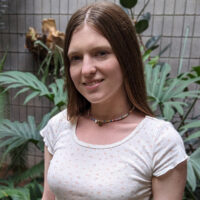
Investigating the Role of HugZ Proteins in Chloroplast Proteolysis and Heme Homeostasis
Chloroplast proteolysis is essential for maintaining chloroplast function, with the CLP system playing a key role in selectively degrading misfolded or damaged proteins. CLPC1, an essential chaperone, delivers substrates to the CLP protease core, facilitating this process. In a recent study, an in vivo CLPC1 substrate trap with a C-terminal STREPII affinity tag was generated in Arabidopsis thaliana to identify CLPC1 interactors. Among the identified proteins were HugZ1, HugZ2, and HugZ3, which contain HugZ-like domains and are predicted to localize in chloroplasts, functioning as heme binders due to their domain similarities with known heme-binding proteins such as GBP. Transient expression and confocal laser scanning microscopy revealed that HugZ1 and HugZ3 localize within the chloroplasts of Nicotiana benthamiana leaves, as indicated by overlapping GFP and chlorophyll fluorescence. UV-Visible spectrophotometry further demonstrated that these proteins exhibit a characteristic Soret peak around 425 nm upon incubation with hemin, confirming their heme-binding ability. No such peaks were observed in the absence of hemin. These findings strongly suggest that HugZ1, HugZ2, and HugZ3 are heme-binding proteins localized in chloroplasts, indicating a potential role in chloroplast heme homeostasis. Further studies are needed to test if HugZ1,2,3 overexpression in Arabidopsis thaliana will result in observable phenotypic changes.
This 10-week internship has been one of the most impactful experiences of my academic journey. Coming to BTI, I was uncertain if plant biochemistry research would match my expectations or if my skills would suffice for conducting complex research. However, guided by two remarkable mentors, Pratyush Routray and Klaas van Wijk, I was encouraged to take on challenging tasks, which boosted my confidence. The demanding yet rewarding project work truly reinforced my enthusiasm for scientific research. After spending almost ten weeks in the research lab, attending weekly seminars, and participating in social outreach programs, I am confident I made the right choice. This experience has solidified my interest in plant biochemistry and equipped me with the foundational skills needed to pursue my own research for my senior thesis.
